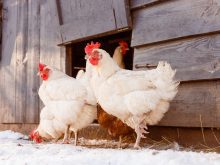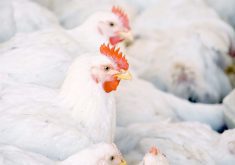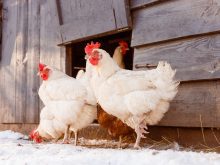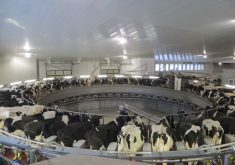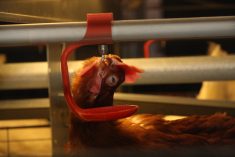Alberta firm specializes in collecting eggs from small producers, but Egg Farmers of Alberta says rules not followed
NOBLEFORD, Alta. — Eggs supplied by 26 farmers move efficiently through the washing and grading process at Galimax Trading Inc.
From there, the company distributes them on the producers’ behalf to restaurants in the Calgary area.
How much longer that will occur is open to question because of an ongoing clash between Galimax and Egg Farmers of Alberta.
The company has an egg grading licence from the Canadian Food Inspection Agency, but it also needs a provincial licence from the EFA as required by provincial agricultural marketing regulations.
Read Also

Farming Smarter receives financial boost from Alberta government for potato research
Farming Smarter near Lethbridge got a boost to its research equipment, thanks to the Alberta government’s increase in funding for research associations.
It doesn’t have one.
“We’re actually on the cusp of legal action,” said EFA general manager Susan Gal about the licence requirement.
That isn’t the only bone of contention between the firm and the EFA.
The egg producers, many of them youngsters making their first foray into production, all have fewer than 300 laying hens, which exempts them from the supply-managed quota system.
However, they must each have an exemption number, and Gal said not all of them do.
“All registered egg producers with quota must belong (to the EFA),” said Gal. “All exempt producers that ship to a registered grading station must have an exemption number from us, and that’s what we’re trying to get them to do.”
Corne Mans of Galimax said his firm is trying to meet the EFA requirements and has applied for the needed grading licence. He said it is also working to get an exemption number for each of its egg suppliers.
“We feel it’s very close to being resolved,” he said.“I guess the big question is, are we going to be able to continue to compete?”
EFA rules require egg producers to pay a per-dozen levy, which fluctuates according to provincial egg supply and other factors.
Last week, the levy was 31 cents per dozen, which Mans said Galimax is now paying on behalf of its egg suppliers. However, the levy lowers Galimax’s revenue, and Mans said passing the charge to its 26 suppliers would kill the young producers’ initiative.
“We felt it was a lot of extra work because we need to do all the bookkeeping to keep track of all these numbers and we’re very small on the scale of eggs,” said Mans.
“I think what’s important is we’re making a footprint on very good quality eggs coming out of southern Alberta. We feel we’ve opened a very positive, different environment in regards to production of eggs.”
Gal said the EFA has been working to resolve issues with Galimax for several years, and it is guided by provincial legislation regarding product marketing.
“When processors grade eggs in Alberta that are not registered quota holders, all processors that process exempt production must deduct and remit a levy to the board on a weekly basis. It’s about fairness and equity,” said Gal.
The levy covers costs for EFA administration but also for dealing with “excess supply” of eggs in the entire system, which might involve shipping them to plants for further processing.
Mans said he doesn’t see the advantage for Galimax in having its egg suppliers belong to the EFA. There is a market for all the eggs it now collects and it provides them to customers within seven days of laying.
“So far as Galimax has been paying the levy, we haven’t received any direct benefit,” said Mans.
Gal said the egg system applies to all producers and graders.
“You can’t pick and choose the various pieces of the system that you want to support. If there was no system, they wouldn’t be getting the price that they’re getting for all of the eggs that they sell,” she said.
“They’re (Galimax) making it sound like they have a choice. This is the law in Alberta and all processors must comply. It’s our obligation under the Marketing of Agricultural Products Act.”
However Mans said he wonders how small-scale producers like his egg suppliers fit with large-scale farmers, who have on average 14,000 laying hens.
He said Galimax and its egg suppliers want a review of the EFA.
Contact barb.glen@producer.com







